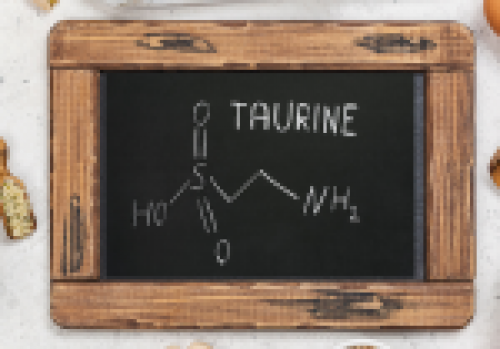Health Benefits of Taurine

Article Summary
Taurine is a semi-essential amino acid, meaning the body can produce it, but it can also be obtained from food or supplements when needed. Found in organs like the brain, heart, and muscles, taurine plays an important role in hydration, digestion, and mineral regulation. It helps with bile production for fat digestion, supports eye and nervous system health, and acts as an antioxidant to protect against inflammation and stress.
Taurine offers known benefits like improving hydration, supporting the nervous system, and enhancing eye health. Studies suggest it may also improve heart function, help prevent heart disease, enhance insulin sensitivity, and boost exercise performance by reducing muscle damage and fatigue. However, excessive taurine intake can cause side effects such as nausea, headaches, or stomach pain. It can also interact with medications like antidepressants and blood thinners, so caution is advised.
While energy drinks often feature taurine for its athletic benefits, the synthetic version is plant-based and not harmful on its own. However, the added sugar and caffeine in these drinks can be risky. For most people, a balanced diet with protein-rich foods is enough to maintain healthy taurine levels, and supplements are only recommended in special cases. Always consult a healthcare provider before making changes to your diet or taking supplements.
Want to know more details?
Check out the full article below.
References
-
Schaffer, Stephen W., et al. “Effects and Mechanisms of Taurine as a Therapeutic Agent.” Amino Acids, vol. 46, no. 1, 2014, pp. 1–5. https://www.ncbi.nlm.nih.gov/pmc/articles/PMC5933890/
-
Jong, Chian Ju, et al. “The Role of Taurine in Mitochondria Health: More Than Just an Antioxidant.” Molecules, vol. 26, no. 16, 2021, article 4913. https://www.ncbi.nlm.nih.gov/pmc/articles/PMC8400259/
-
Schaffer, Stephen W., et al. “The Anti-Inflammatory Effect of Taurine on Cardiovascular Disease.” Cardiovascular Therapeutics, vol. 38, no. 2, 2020, article e12527. https://www.ncbi.nlm.nih.gov/pmc/articles/PMC7551180/
-
Marcinkiewicz, Janusz, and Ewa Kontny. “Taurine and Inflammatory Diseases.” Amino Acids, vol. 46, no. 1, 2014, pp. 7–20. https://www.ncbi.nlm.nih.gov/pmc/articles/PMC3501277/
-
El Idrissi, Abdeslem, and Nicole A. L’Amoreaux. “Taurine Regulation of Neuroendocrine Function.” Advances in Experimental Medicine and Biology, vol. 1155, 2019, pp. 105–113. https://pubmed.ncbi.nlm.nih.gov/31468461/
-
Schaffer, Stephen W., et al. “Taurine: The Appeal of a Safe Amino Acid for Skeletal Muscle Disorders.” Journal of Translational Medicine, vol. 12, 2014, article 205. https://www.ncbi.nlm.nih.gov/pmc/articles/PMC4513970/
-
Prentice, Howard M., et al. “Taurine Supplementation as a Neuroprotective Strategy upon Brain Ischemia.” Amino Acids, vol. 50, no. 5, 2018, pp. 735–742. https://www.ncbi.nlm.nih.gov/pmc/articles/PMC8952284/
-
Schaffer, Stephen W., et al. “Emergence of Taurine as a Therapeutic Agent for Neurological Disorders.” Neural Regeneration Research, vol. 18, no. 1, 2023, pp. 51–57. https://www.ncbi.nlm.nih.gov/pmc/articles/PMC10479846/
-
Schaffer, Stephen W., et al. “Functional Role of Taurine in Aging and Cardiovascular Health.” Nutrients, vol. 15, no. 10, 2023, article 2185. https://www.ncbi.nlm.nih.gov/pmc/articles/PMC10574552/

Further Reading on Supplements:
- How Magnesium Helps Your Body
- Ubiquinol / CoQ10 Benefits and Side Effects
- Health Benefits of Taurine
- Could Your Pain Be Caused by a Vitamin D Deficiency?
- B Vitamins: Essential Nutrients for Optimal Health
- Can B6 Cause Neuropathy?
- Sulforaphane, Mitochondria, and Oxidative Stress
- Functions of Lysine in the Body
- What are Adaptogens and How Do They Work?
- How Milk Thistle Supports Liver Health
- What Does L-Carnitine Do for the Body?
- Glutathione: The Master Antioxidant
- TUDCA for Liver and Gallbladder Health
- Health Benefits of Alpha Lipoic Acid (ALA)
- Benefits of Black Seed Oil
- Understanding Polyphenols: Nature’s Potent Health Allies



